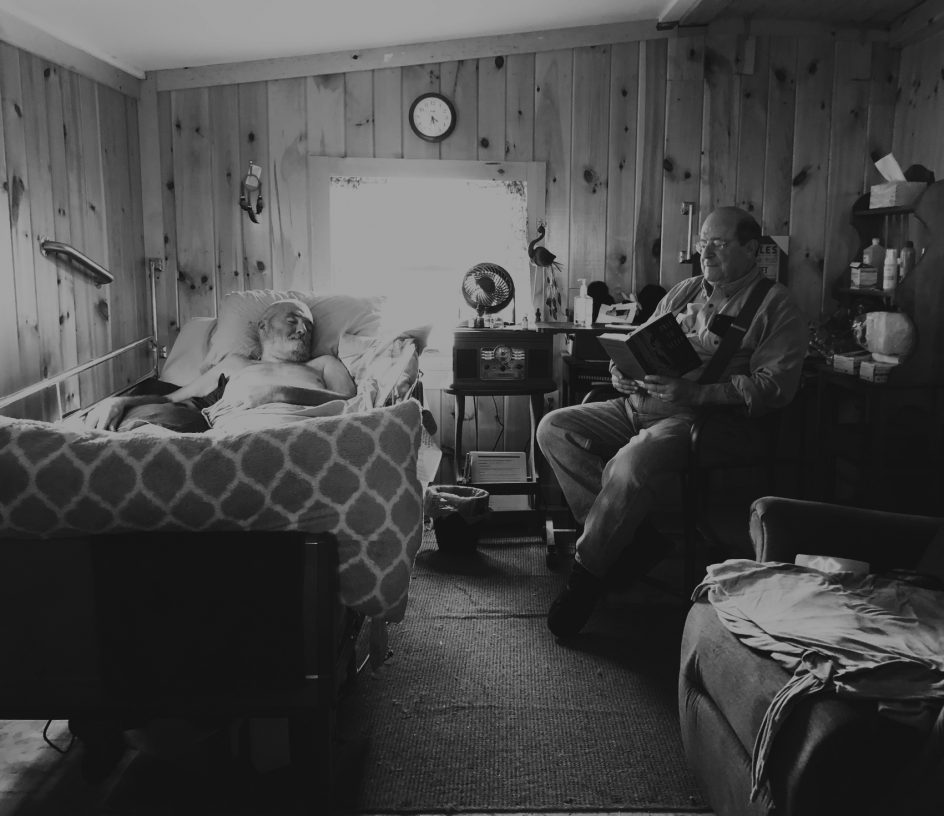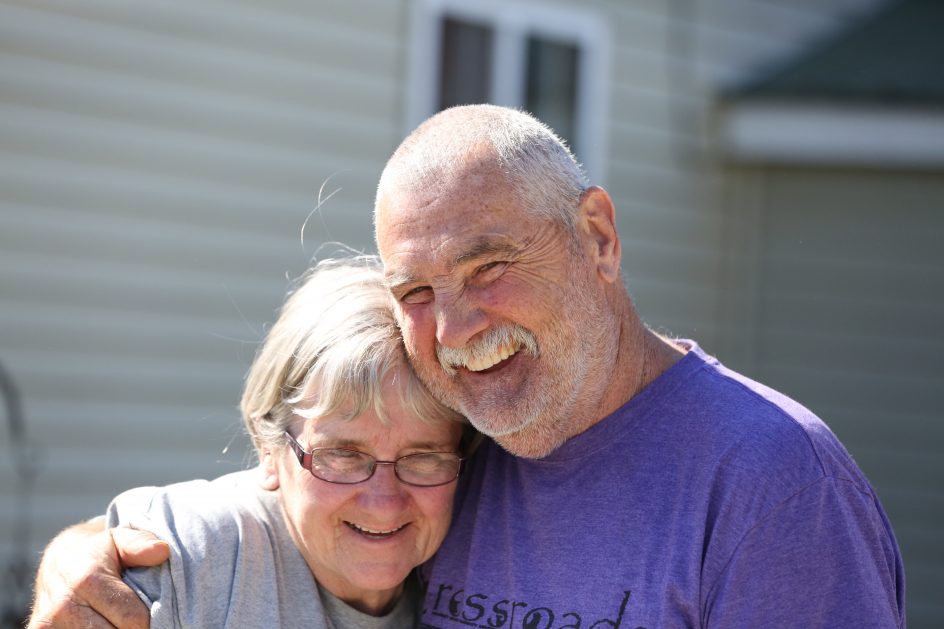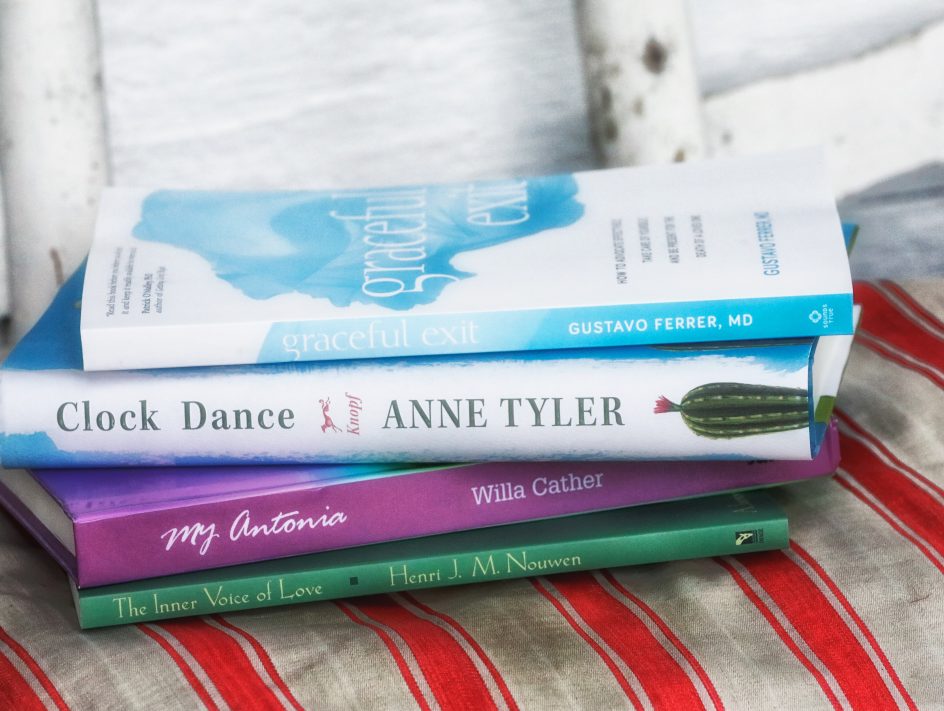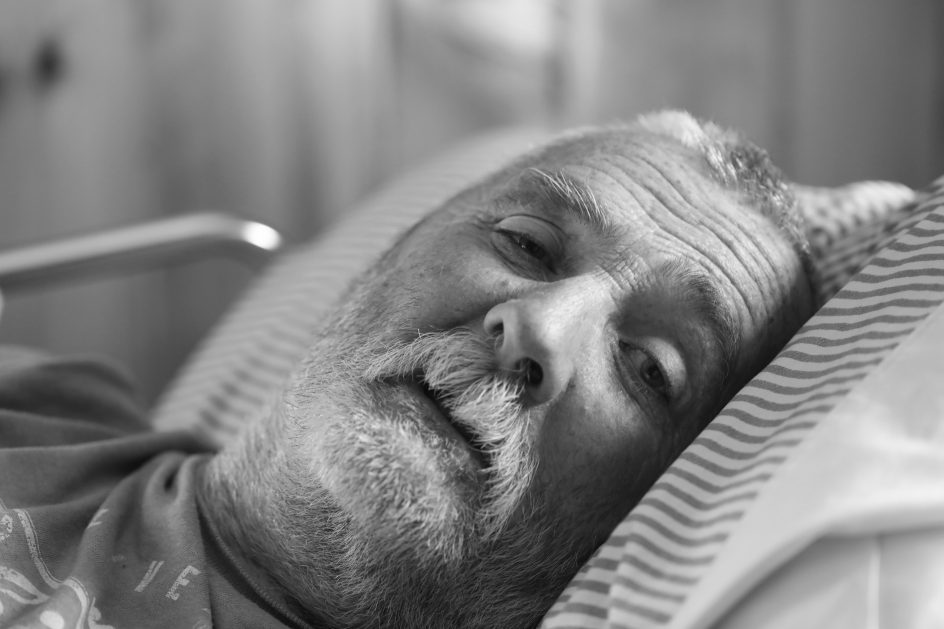
After the storm, a wildflower.

Sometimes I read to Ed, sometimes I read with Ed while he sleeps. Ed woke up this afternoon and we talked. He said he wondered why they didn’t give him an overdose, he said is useless this way. I said they don’t give overdoses, and he said he knew that.
He said he was in great pain and this was no way to live. He said the pain was not coming from any one place, but was all over his body. He asked for his morphine dose, which Carol gave him orally.
If they couldn’t cure him, he said, they ought to let him go. I said nothing except I knew it must be hard. He said he just felt useless, there was no reason to be alive.
Carol said she wasn’t forcing Ed to eat, but was encouraging him to eat. All day, he ate nothing but some ice cream, he had little water and no food. For Carol, watching her very engaged and energetic husband decline in this way is very hard. Watching him refuse food and water was even harder.
Maria walked out side to get something from her car and took this photo.
After he and talked briefly, he fell back to sleep. It was the first time I saw him awake in three days. We held hands for a while and then shook hands, he said “I love you, Jon.” Then he closed his eyes.
I hope he doesn’t have to suffer in this way for too much longer. Carol is wearing a brace for her torn ligaments, and it is helping. She and Maria sat in the kitchen and talked for an hour, we see that these talks are important for her.
Since Ed began taking his morphine doses, he has been sleeping longer and more deeply, and Carol looked tired but better rested than on previous nights. Family members began showing up, so we came home to rest ourselves.
A lot going on, I felt it all today somehow, it seemed a long and hard day.

There is always a point in the homes of the dying when there is a paradigm shift, that is when the dynamic changes, and the caregivers need caregivers. It is sometimes subtle, sometimes dramatic. The patient needs care and attention, but less, and the caregiver not worn down, needs more.
In hospice care, a paradigm is always signaled when the patients starts taking morphine. That is the boundary between one phase and another Morphine eases pain and anxiety and brings a deep sleep.
The morphine eases the pain Ed has been having and helps him rest. It makes him comfortable. If necessary, the doses will be increased to keep him comfortable and ease, there is no need for him to suffer now, and Carol recognizes now that there will be no more walks outside to visit the cows.
Morphine means the patient will be less alert, will sleep more, be less available, less needy.
It means caregivers like Carol, who sit up alongside their partners all night in case they need something, will most often need something to read.
In fact, yesterday, Carol asked me if I could bring a book of essays by Joan Didion that I assigned to me writing class, and late at night, she texted me a photo of her sitting up holding one of my short story books. Before this, Ed was up and calling for help, and upset and restless and Carol had no time to sleep.
I sense Carol needs Maria and me now in a different way than before.
She needs to talk and wants to talk and speak out loud about the things on her mind. She knows we have no answers for her, and so do we, but we can listen, and that is a big deal. She appreciates that we are not her to offer advice.
I am also surprised to see that the fresh vegetables and fruit we bring are valued and devoured by her and her family. I forget that farmers are always too busy to have healthy and fresh food around, they eat stuff my cardiologist would not like.
But now, Carol – she is in her sixties and had open heart surgery the same time I did, is a wreck – she is tired and emotionally drained – and sometimes overwhelmed.
She is in great pain from her torn ligaments and has yet to get to see a orthopedist or even have one call her back.
Time to focus on her, there is nothing much to do for Ed that I can do. He asked me to keep an eye on Carol, and I will. She is my friend also, Maria’s too.
In such situations friends, cousins, blog readers, neighbors, all kinds of people will bombard her with advice and ideas and experiences they think might be helpful to her, but I have no desire to do that.
Anyone in this situation will be drained and worn out, there is no easy or peaceful way to do it, especially if you live in America and are not rich. There is never much of net between you, not even during this brutally difficult time. Americans, especially those online, think there is a miracle cure for just about everything. There is no fix for this.
I let Carol have her suffering, she is entitled to it.
Disaster and sadness are always peeking just around the corner.
And that is life, sometimes it simply will be hard. You can make death softer sometimes, but never easy or easier for those who have to wait and watch. Death is what death is. Books can make it softer.

Carol is also nursing torn ligaments in her leg. I keep asking her if she has a brace yet, and she keeps telling me that the orthopedist hasn’t called her yet – he’s three days late – so that’s my limit, we went out to the pharmacy and bought an Ace adjustable knee support brace, it was recommended by the pharmacist.
Maria and I also gathered some books we had, and went to Battenkill Books to get a few more, Carol might have a lot of time to read in the coming days.
I chose four books:
A new novel, Clock Dance, by Anne Tyler, a lovely story about family and connection.
A book by Dr. Gustavo Ferrer called “Graceful Exit: how to advocate effectively, take care of yourself, and be present for the death of a loved one.” I’ve been reading the reviews, the book seems right for the vulnerable who need to be very strong.
And there is the classic story of a prairie farm wife, My Antonia, by Willa Cather.Carol, like Maria, could easily be a character in that book.
The Inner Voice Of Love, by Henri J.M.Nouwen, a favorite spiritual writer of mine.
This kind of support is so important i think.
Carol has an army of practical helpers around her, including her four children and grandchildren. They are all a part of this, but they don’t have much time to browse bookstores. Thanks to Battenkill Books for helping me make these choices.
I believe these books are things she will need to take her out of herself, pull her into something else. You can go mad if you live with suffering and death 24 hours a day, seven days a week, and Carol is not good at taking care of herself. This could go on for days, or weeks, and the darkest pace is just coming.
A friend and reader sent me a long message urging me to talk to Carol about acupuncture, for her leg and her psyche. I told her I can’t do that, she wouldn’t want that now, and I don’t interfere with her medical care or choices. She trusts her doctor and listens to him, and he is available to her.
It is not appropriate for me to interfere with her health care decisions, not unless asked, which I have not been. Lots of people are telling her what to do. And farmers are wary of new things.
The Gustavo Ferrer book gave me pause. Carol cannot yet say “die” or “death” when talking about Ed, she is just not there yet, even though she does acknowledge it is coming. But when she is there – and she will be – it will be good to have a gentle book that will help her understand the process she is in, and give her ideas about taking care of herself.
I think each book offers a different thing for her – two readable novels from wonderful women writers, a deeply spiritual book when one needs to go inward, and a book that will make her feel less alone.
These are books to mark the new paradigm shift, it is a process and Carol is in it.

Darkness is a good and necessary teacher.
I took this photo of Ed about a week ago. Ed does not look like this now, and I miss him. When I saw this look, it always meant we were about to mix it up a bit, challenge one another, stir the pot.
Since we are both story tellers and pot stirrers, this was a gift.
The minutes after I took this photo marked the last time we really spoke with one another, and the last time I saw the creative spark of life in his eyes.
I believe if flickered and went out that day, I saw it happening. The spirit of the Ed I knew as a friend went off to a better place, the body remains on its own path.
Some of his brightest lights went out.
This was when we said goodbye to each other.
Watching my friend die in this way is painful, much more for his wife and family than for me. Ed and I said our goodbyes, we talked about this moment, we both knew it was close and would inevitably come. After that, he said, he would simply accept what was next.
What was next is now.
I believe Ed has been as good as his word. People complain more about their cat’s vet bills than Ed has complained about his brain cancer.
Sitting with Ed and Carol, spending time with their family, I have had time to think about how I feel about all this, what the darkness is teaching me, and about how the death of someone close to me will affect me.
First, I realized that I was getting angry. If Ed had been kicked in the head by a cow or fallen off the roof of his barn, it would have been awful, but it would have made some sense to me.
That was the life he chose, and even expected. He had no complaints about the life he chose.
But cancer is different, it is such an insidious thing, so sneaky and venal, it had been working away steadily on his brain, spirit and his body, perhaps for years. All winter, he was speaking of unusual fatigue and disorientation.
But what really made me angry, I realized, was the incessant whining and complaining I hear all the time from people who do not have cancer, are healthy and well and living their lives, even if they can’t quite take responsibility for them.
I remember somewhere in the Bible where Ezekiel the Prophet was ordered to eat the scroll that is “lamentation, wailing and moaning” and that lived in his belly. It would eventually, and with God’s help, turn into honey.
I know someone who laments and wails and moans more in a single e-mail than Ed Gulley has lamented his cancer in all of the weeks since he was diagnosed. I thought on that. My friends tell me I a not a whiner, and I hope this is so. Because I would hate that.
There are two kinds of people I find I simply have no respect at all for, hypocrites and whiners.
When people tell me they are stunned with their dog dies, I think, “well what did you expect? That they would live forever?” It seems hard to me that I feel this way, but it’s how I react to whining.
A friend messaged me and said she had been crying all day because her car need two new tires, and she just hadn’t planed on spending that extra money. “How could this happen to me?,” she asked. How would you feel about brain cancer?, I wondered.
Do you have the money? I asked. Yes, of course, she said, I am not a pauper. I wanted to say, then shut up and go get your tires, but instead I just decided I didn’t really need to be her friend any more. She will need new tires too often.
I have another friend, a good friend I always thought, who can’t open his mouth without whining, moaning and lamenting. Ed helped me to see that I don’t need this person in my life.
I hope I learn not to be angry at the whiners and moaners, they, like me, are just trying to make their own way. I am just not there yet.
Sitting with Ed, I find that darkness is a good and necessary teacher. I can’t avoid it, run from it, rationalize it or always explain it. I can’t hide from it. When I am in darkness, I find inspiration, not defeat.
The light has to come next, it has to be close, it is never far away.
Ed has taught me a lot, he is teaching me something every day.
These days, he is teaching me about patient endurance. Once he understood what was happening to him, he rolled his eyes and winked at it.
Okay, he said to the cancer, you do your thing and I’ll do mine, I know where this is going. Sometimes, at night, he has cried out in anger as his tumors move through his brain. But that is not his voice, the cancer can talk.
When the light came, he returned to form. The creative spark in his face always came back. Now, it is gone, and he is in the final chapter. Ed was always learning from the darkness, he was trying to outthink his illness, if he couldn’t stomp it down outright.
But he never fled from it or pretended it wasn’t there. Perhaps he can walk away in peace now.
Patient endurance is the process of enduring difficult circumstances with an even temper, and without drama or self-pity, it is the art of accepting delay or disappointment with equanimity, it is about persevering rather than lamenting.
Patient endurance is important to me. I think it was – is – something Ed and I share.
I first encountered it consciously when I was being rolled into the operating room for my Open Heart Surgery four years ago. I was expecting to be terrified, but was surprised to see that I was not. I wasn’t frightened at all.
This is life, I thought, grace is not about having no troubles, it is about how i handle them.
We can not expect a perfect life, I remembered thinking as I held Maria’s hand for what i thought just might be the last time. I think the prophets call this redemptive suffering.
True patience comes from the desire to hold together the always mixed reality of joy and suffering, hope and fear, loss and gain.
I learned earlier in my life not to expect a perfect life, and later on not to be angry or resentful when it wasn’t perfect. Is it ever? Yearning for a perfect life would only make me angry and resentful, since it is not possible for mortal humans.
The philosopher Nietzsche said he could never trust deeply religious people because they seemed to him to be full of resentment. False expectations create resentful people.
Of course, when I sit and look at Ed, it occurs to me that this could be me one day. If these mysterious killer could strike down this vibrant and powerful man, it could easily find me.
Ed’s kind of darkness is very different from needing new tires or perpetually moaning about your life and blaming other people for your troubles. He can only hope for something he doesn’t know and cannot ever see.
When I find myself in darkness now, I ask myself: “what can I learn from this? What does this tell me about my life?”
I always take a gift back home with me from the darkness.
I learn something about being a grateful person emerging in a world thoughtfully and accurately defined, where the darkness is not an awful shock, but a precious opportunity as well.